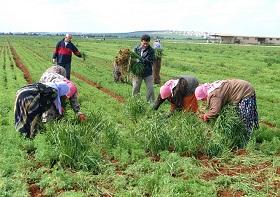Using AI to control energy for indoor agriculture
30 September 2024
Published online 28 November 2013

As prolonged monoculture continues to deplete land and water resources, an initiative to promote double cropping of wheat and legumes has been set up to target eight countries in North Africa and West Asia.
The International Center for Agricultural Research in Dry Areas (ICARDA) says alternatives to monocropping can help combat food insecurity and reduce the impact of climate change. It hopes adopting new practices will reduce rural poverty and improve nutrition in Algeria, Egypt, Jordan, Lebanon, Morocco, Sudan, Tunisia and Turkey.
Wheat monocropping and the use of limited seed varieties is unsustainable, according to Mohamed Kharrat, who leads the ICARDA project. But intercropping – where wheat planting is interchanged with legumes – improves soil fertility by increasing nitrogen and protein.
Faba beans, chickpeas and lentils, the most commonly cultivated food legumes in the region, can fix atmospheric nitrogen in the soil through a symbiosis with the Rhizobia bacteria living in their roots. "This produces grains with high protein levels and residues which are rich in nitrogen, which means that when the wheat replaces the legume in the field it needs less chemical nitrogen fertilizer," says Kharrat.
Because wheat and legume staples provide a cheap source of protein, growing them in larger quantities by alternating crops can break disease cycles. It also helps farmers cope with erratic rainfall and frequent drought and increasing salinity.
ICARDA is also funding the development of genetically-improved seed varieties that give higher yields and are less susceptible to diseases and pests, says Kharrat. One of the project's goals is to popularize these new varieties through public and private seed distribution systems in the countries.
ICARDA's programme hopes to encourage farmers to adopt conservation agriculture practices – where fields are not plowed and crop residues are left to improve the soil's fertility and water conservation. Kharrat says, though, that the take-up of these techniques will be determined by each country's agricultural polices. "This technology may not be developed in all the target countries."
The biggest challenge for the project will be the farmers' approach. Some may be resistant to changing techniques practiced for generations, says Hammou Laamrani, who works in agriculture and food security at the International Development Centre in Cairo (IDRC). Rotating cereal and legume crops is not a common practice in the region.
ICARDA recognizes this, and have been working directly with small farmers on their fields to demonstrate the benefits of integrated crop management practices. "To facilitate adoption by poor farmers, we try to make this technology accessible and not too costly," says Kharrat. "We also conduct farm field schools and field days to show farmers the potential of these crops."
doi:10.1038/nmiddleeast.2013.227
Stay connected: